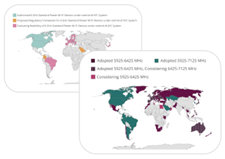Wi-Fi Alliance is committed to influencing regulation and policies to open and protect valuable unlicensed spectrum resources
Unlicensed spectrum – where Wi-Fi operates – is one of society's most vital resources and a crucial component to connecting everyone and everything, everywhere while also delivering immense socioeconomic value. Today’s priority remains driving the global adoption of the full 6 GHz band for unlicensed use so that Wi-Fi can continue to be relied on to deliver daily connectivity and enable future innovation. As new spectrum opportunities unfold, Wi-Fi Alliance will continue to advocate for fair spectrum policies that foster a robust ecosystem, economic growth, and unparalleled connectivity.
Discover 6 GHz’s global progress
View the maps to learn which regulations are enabling 6 GHz Wi-Fi and Standard Power devices under control of AFC.

6 GHz Wi-Fi videos
Wi-Fi's impact on gigabit connectivity in Europe
Wi-Fi enables a variety of use cases critical to the European way of life. We rely on Wi-Fi for work, admin, and play. Wi-Fi makes it easy for people to access fixed broadband networks, and with the substantial increase in Wi-Fi traffic in Europe between now and 2030, European countries will need to make more spectrum available for Wi-Fi. Wi-Fi needs access to the full 6 GHz band to provide gigabit coverage throughout a building. Without license-exempt access to the upper 6 GHz band, it's impossible to realize the full potential of Wi-Fi technology. Many of the world's most advanced economies have made the entire 6 GHz band license-exempt. The rapidly growing demand for Wi-Fi connectivity requires 6 GHz operation in order to be successful.
Featured 6 GHz news & resources
View all resources
Wi-Fi Alliance® demonstrates the impact of 6 GHz Wi-Fi® for advanced AR/VR in healthcare
Wi-Fi Alliance® and Ramathibodi Hospital, Mahidol University have been working together to promote the value of 6 GHz Wi-Fi®. In July, Ramathibodi…
Advocate for 6 GHz and influence regulatory conditions for Wi-Fi worldwide
Wi-Fi Alliance members can join the Regulatory Task Group to advocate for favorable regulatory policy to support the growing Wi-Fi ecosystem and contribute to regulatory proceedings worldwide.
Not a member and interested in advancing the future of Wi-Fi globally?

